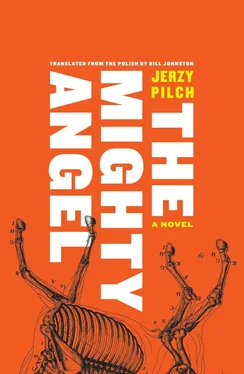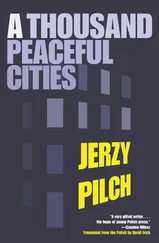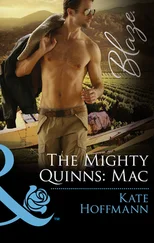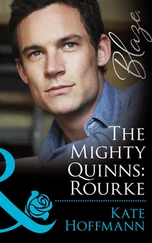In the hallways of the ward all the voices and all the melodies of the world join together, and sometimes in the plaintive polyphony I can distinctly hear the highland tune that Old Kubica sang decades ago in the snow-covered yard. The melody is the same but the words are different; he’s bent over the slippery barkless trunk of the fir tree and, inspired it would seem, sings whatever comes into his head:
You’re not here, you’re not here, you’ll always be gone.On the lake, on the lake, there swims a white swan.
Is my grandfather singing a song for the death of the merchant from Ustroń, who he is going to kill the next morning? Or for the departure of Fuchs the chestnut mare? Or for his own departure in the company of the police? Is he singing about me? Is he singing about you? You’re not here, you’re not here, you’ll always be gone. No, you’re here. I am here. I’m here because I do not choose death. Old Kubica, given a choice between the lack of a bottle at his bedside or death, would have chosen death. I choose life, and Old Kubica drinks to my health in the heavenly pub, where an angel tops up his glass. Grandfather, I say to him, drunken father of my drunken father, grandfather, I was in the same snow-covered yard; a bottle stood at my bedside, the same black perspiration poured from me, my heart quaked and my hands shook. But I choose life. At my side there is a love that is as strong as your singing; it brings me salvation. Our addiction, which killed you, drops from me as the skin of the snake drops from the snake; I am victorious, and I’m sharing my victory with you. I’m writing about you and I’m writing about myself not only to show that true alcoholic prose does not end in death; it ends in life, and who knows how life will end.
After an hour, or perhaps two, of work Old Kubica suddenly jumps up. Maybe he’s decided to do immediately what he was going to do the next day; maybe he’ll hitch the horses to the sleigh and gallop off amid billowing snows to Ustroń, the axe at his feet. But no, Old Kubica jumps up because what always happens to us is happening to him: the time comes when a person has to have a drink. And my grandfather, already possessed of the knowledge and certainty that he would soon be having a drink, and mightily relieved by this fact, throws his immense sheepskin coat round his shoulders and goes to the pub. He sits in the furthest corner and orders Baczewski, the most expensive vodka. He pays for successive bottles, but to all those who during the day, and also now after dark, want to come and sit with him, he says:
“Don’t sit with me today. Sit somewhere else.”
Today the only person who can put his glass next to Old Kubica’s glass is Dr. Swobodziczka. The doctor comes into the pub in the late evening; he’s on his way back from visiting someone whose aches he has eased (early tomorrow the pain will pass, in three days the temperature will be gone, in four days you’ll start to feel weak, in five days I’ll come again), he’s on his way back from visiting someone whose pre-mortal or perhaps life-giving sufferings he has eased. First he shakes Old Kubica’s hand without a word, then he sits down and gazes at him intently.
“You’ve lost everything,” he says, half stating, half asking.
Old Kubica says nothing.
“Property’s just something to be bought. In a year you’ll get it all back, in two years you’ll have even more.”
Old Kubica says nothing; he picks up the bottle with a smooth motion, but the doctor places his hand over his own glass.
“It occurred to me not to drink,” he says in a tone that is striving not to be apologetic.
Grandfather turns to him with great difficulty, his face altered, his features drained of expression.
“How long for?” he asks in a voice not his own. “How long for? A month? Till Easter? A year?”
“It occurred to me not to drink at all,” the doctor now says with relief; the guilty note is gone from his voice. “I woke up this morning and decided not to drink, but I didn’t have anyone to tell, because no one would believe me anyway. Since, as you know full well, Paweł, one drunkard can only be fully understood by another drunkard, I tried to tell my fellows in addiction, but they were all already drunk. So I came to the conclusion that a drunkard who’s decided to say goodbye to booze can only be understood by another drunkard who’s also decided to say goodbye to booze. Unfortunately, all day long I’ve not been able to find anyone like that in our neck of the woods. I see that I’ve come to you too late as well, Paweł.” The doctor slightly raised the hand that was covering the empty glass. “And it’s a great, great pity. I’m convinced it’s a fine idea — the only way. After that a third drunkard would be found who also wanted to say goodbye to booze, then a fourth, a fifth, a hundredth, a ten thousandth. There’d be a whole army of drunkards supporting each other in not drinking. If you’d not had a drink today, Paweł, we’d go down in history as the founders of a worldwide movement. I really feel sorry. .”
“Sorry for what?” asks Grandfather Kubica, still in a voice that isn’t his own. Not everything the doctor has said has gotten through to him, and what has gotten through is utterly staggering.
“Sorry for Poland,” says the doctor bitterly. “Sorry most of all for Poland. Poland could have been the first, but this way America’s going to get there before us yet again.”
“America,” grandfather repeats mechanically, and he thinks of America, from where he returned ten years ago, and he thinks of green-eyed Jennifer, the pastor’s daughter, with whom he twice went for a walk. They strolled down a path between two endless fields of corn; on the horizon was the Mississippi River, vast as an ocean. My grandfather didn’t understand what the green-eyed daughter of the pastor was saying to him, but he longed for her to confide in him about her intense emotions, to try and persuade him to stay for good, to tell him about the log cabin they would share, from the windows of which they would be able to see the great flowing Mississippi.
“I feel sorry for Poland,” repeated the doctor. “Sorry for life, sorry for us.”
“Either way, here or there, in Poland or in America, either way we’re going to die,” says my grandfather, and he sees the doctor’s hand not only capitulate and cease guarding the empty glass, but even, in an eloquent gesture, push it toward the almost full bottle of Baczewski.
And grandfather fills the doctor’s glass, and both of them drink, and both of them say:
“Good health, good health!”
The scale tips again, this time not in the direction of evil spirits: this time the scale tips in the direction of hell. The last glassful fills the measure and exceeds the measure. Old Kubica feels the vodka bursting his skull open.
“America, America,” he sputters; flecks of foam appear in the corners of his mouth. Yet he stands up with unexpected ease and walks toward the exit with an even tread. He forgets his sheepskin coat, which is draped over a chair like a shepherd’s hut that has been demolished by a gale. My grandfather walks through the snow towards home in his black vest and his white shirt with the upright collar. The frost fills the measure and the frost exceeds the measure, and Old Kubica starts to shout, he starts to howl; terrible, terrible is his howling, he howls the way I howled when the mafiosi appeared in my apartment along with the dark-complexioned poetess Alberta Lulaj.
•
When was this? It was never. Literature doesn’t exist, because that past does not exist and those stories do not exist. There’s only the present — a late evening in January 1932 or 1933. My grandfather reels and howls like an animal being killed. They hear his howling from a long way off. They run down the hallway and across the unlit yard, place the ladder against the trapdoor to the loft, and agilely climb up, one after another, like a well-drilled fire brigade. When Old Kubica lurches into the yard, not even their breathing can be heard; he himself falls silent and starts to come to his senses. He’s standing in the same place he stood in the morning; he’s standing in the same place, even though it’s impossible to stand in the same place twice. Old Kubica must be reading what I’m writing, because he says, as if he were repeating after me:
Читать дальше












